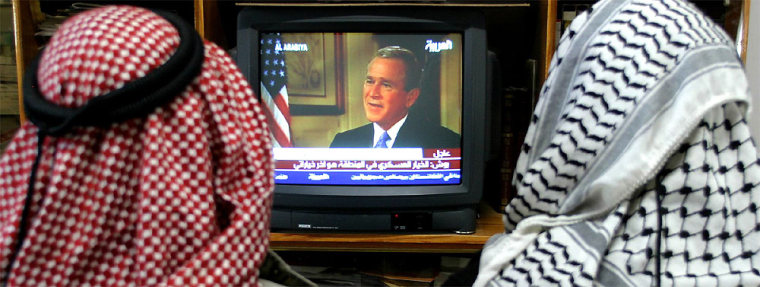If Arabs could vote, Sen. John Kerry would likely win Tuesday's U.S. general election by a landslide — not because of who he is, but because of who he isn't: George W. Bush.
The polling is scant on this issue, but word of mouth as well as newspaper coverage suggests that the Democratic candidate is favored across most of the Arab world; for the majority, Bush is distrusted over his invasion and occupation of a fellow Arab nation as well as his apparent unflinching support for the hard-line Israeli government of Ariel Sharon.
"Most of the people prefer Kerry because they think that they have seen the worst with Bush, his position on Iraq, support for Sharon and his anti-Palestinian stance,” said Samir Barhoum, editor of the Jordan Times.
“Both candidates are pro-Israeli, but [most] believe Kerry may have a milder stance toward the Palestinian issue and Iraq and is more inclined to approach Western allies," Barhoum said. "Bush has been trying to dominate, but not to lead."
Tarnished America’s image
Newspapers have been scathing in their criticism of Bush, asserting he has tarnished America's image as a bastion of freedom and justice and that he should pay for his sins at the polls.
In an editorial entitled "Where Is America Going?" published in the pan-Arab newspaper Al Hayat, columnist Jamil Matar wrote, "The Bush administration has blemished the U.S. reputation as a country that commits itself to respecting the law.… Throughout the past four years, this administration has violated the law in every manner. A second term would aggravate the situation."
In another editorial Matar asked, "What message would be spelled out by the reelection of a government that has incited a tidal wave of anti-Americanism, which has divided the trans-Atlantic alliance, infringed on domestic freedoms … and has used patriotism to restrict freedom of expression?"
In Egypt's Al Ahram newspaper, foreign policy columnist Hazem Abdel Rahman expressed his hope that Bush would lose "because he has lied to the American people and resorted to deceit by claiming that Saddam Hussein had weapons of mass destruction."
He added, "Bush and his administration have made a joke out of Congress and democracy in general and he should be held accountable and punished by the American people so that he would be an example for any future president."
One of Egypt's most popular cartoonists, Gomaa, has sought to reflect this view in his cartoons.
In one cartoon, he showed Osama bin Laden waiting in line amid a group of American voters to cast his ballot marked "Bush."
Some analysts think the al-Qaida leader would relish a Bush victory because the president's policies have helped expand and deepen Muslim animosity toward the United States.
Street reaction
The newspaper scorn underscores the widespread sentiment on the streets, with the possible exception of Kuwait.
An anonymous reader in Dubai pondered in a letter to the Gulf Times why voters would support a president who has turned the world against the United States.
"After four years of Bush's presidency, Americans should take a good look at themselves. Instead of empathizing with them, especially after terrorist attacks on their country, the world hates and despises anything called American today.… Surprisingly, naïve Americans are still supporting Bush."
In Saudi Arabia, Khalid, a government employee who spoke on the condition that his last name not be used, lamented the lack of choice.
"Both are worse, but Kerry seems good because Bush is bad," he said. "Any Saudi prefers Kerry to Bush because they are suffering from this president. He did nothing for the Palestinians or the Iraqi case. He hates Muslims, and this is the reason why Muslims hate him. Kerry says what he says to win the elections, but maybe he will change his mind after that."
Benefit of the doubt
As a result, the Massachusetts senator is enjoying the benefit of the doubt.
"I would like to see Kerry win the elections because he knows more about foreign affairs and while he will still be supportive of Israel, he has a democratic legacy to build on like Presidents Carter and Clinton who have shown interest in dealing with the Arab-Israeli conflict," said Dr. Saad Eddin Ibrahim, a professor of sociology at the American University of Cairo and an advocate for political reform.
In some quarters, jaded observers reject both candidates and their Middle East policies.
"I don't like any of them because they don't like us," said a female Syrian journalist who asked not to be named.
"It does not matter whether Bush or Kerry wins the next elections," wrote Dr. Wasimul Haq in the Al Hayat newspaper. "The American policies in the Middle East and the entire Muslim world will not change in substance."
And from Damascus, Mohamed Agha, political editor of the Syria Times, explained that neither candidate represents the region's interests.
"Both of them are supporting the aggressors and occupiers of our lands. We prefer neither. We prefer the president to take a fair stand and not to side with anyone, to stand with U.N. resolutions about international legitimacy that support the Palestinians' rights. Neither Kerry nor Bush does that," said Agha.
But in at least one country, where memories of Iraq's brutal invasion are still fresh, there is lingering sympathy for Bush.
"I think a lot of Kuwaitis back Bush because this administration led to the downfall of Saddam's regime, which has freed Kuwait from the threat hanging over their heads since 1990," said Jamie Etheridge, executive editor of the Kuwait Times.
"Their economic optimism and sense of relief is attributed to the Bush administration," he said.
